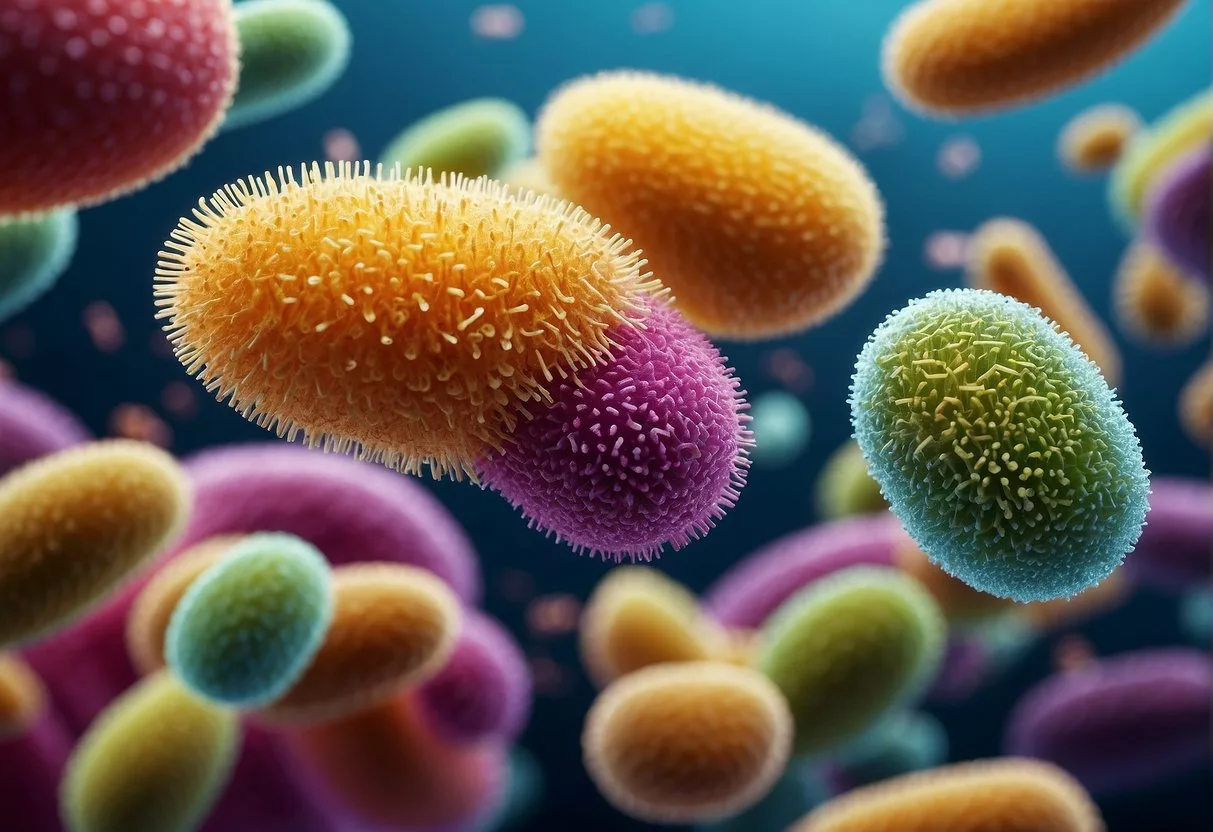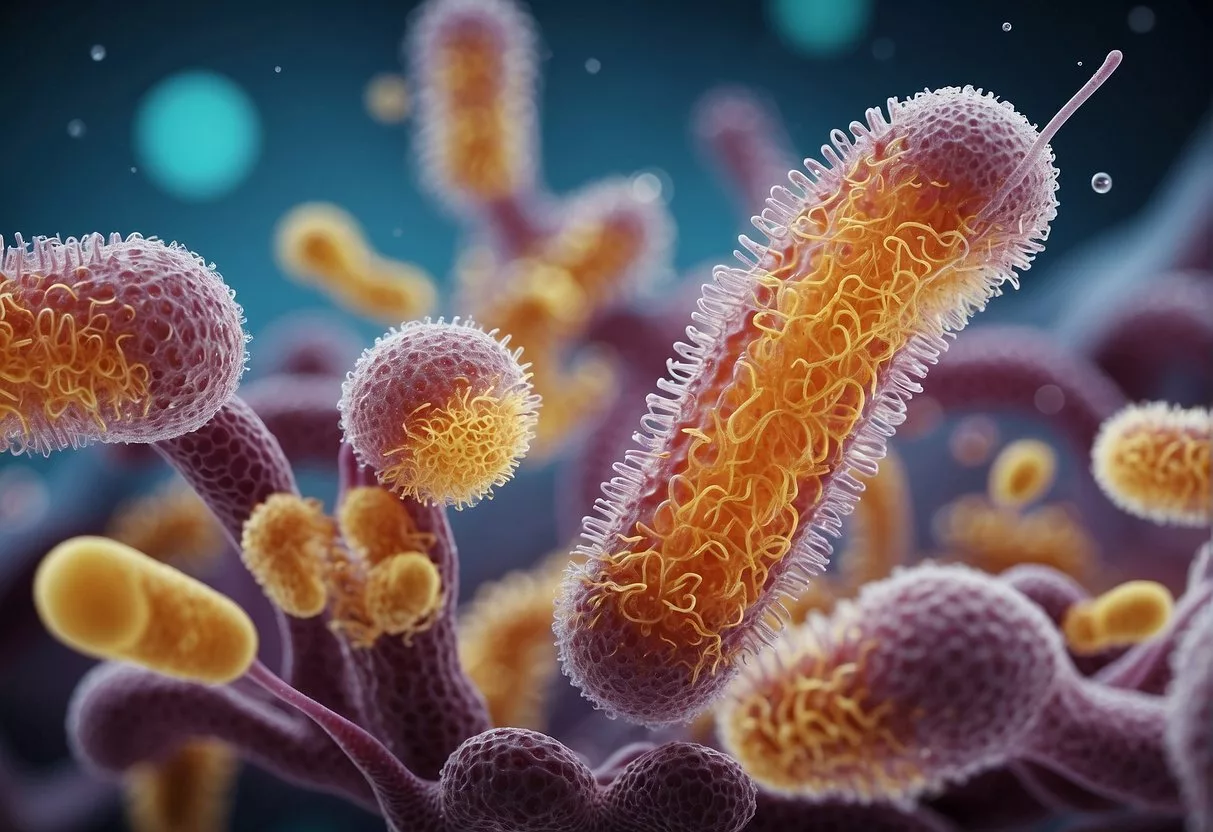When starting on probiotics, a common experience is the “probiotic adjustment period.” This phase can involve various digestive symptoms as the body acclimates to the new gut flora balance.
The introduction of beneficial bacteria via supplementation may lead to temporary changes in gut activity. This manifests as bloating, gas, or altered bowel movements. This adjustment period is generally a normal response to probiotics and should not be cause for alarm.

It’s important to understand that the effects and duration of the adjustment period can vary widely among individuals. The type of probiotic, dosage, and an individual’s unique gut microbiota all play roles in determining the nature and length of the adjustment period.
While uncomfortable, these symptoms can be indicative of the probiotics beginning to work within the body’s ecosystem.
Key Takeaways
- Probiotics can cause temporary digestive symptoms during the adjustment period.
- Individual responses to probiotics vary based on several factors.
- Symptoms typically subside as the body adapts to the probiotic intake.
Probiotic Adjustment Period

When individuals begin taking probiotics, they may experience an adjustment period characterized by digestive changes. This period is temporary and usually resolves as the body adapts to the new gut flora.
Initial Reactions to Probiotics
Typically, within the first few days of starting probiotics, one might experience mild digestive discomfort. During this probiotic adjustment period, symptoms such as bloating, gas, abdominal aches, and alterations in bowel movements, including diarrhea or constipation, can occur.
These reactions are the body’s response to the changes in the gut microbiome as the beneficial bacteria establish themselves.
Timelines and Expectations
The duration of the adjustment period varies from person to person. Most people can expect these initial side effects to subside within a few days to a week.
It is essential to monitor one’s symptoms, as they typically diminish as the beneficial effects of the probiotics take hold. If symptoms such as bloating, gas, or aches persist or worsen, consulting with a healthcare provider is advisable to rule out any underlying inflammation or other issues that may not be directly related to the probiotic intake.
Health Benefits of Probiotics

Probiotics, composed of beneficial bacteria, play a pivotal role in maintaining health by supporting gut health, enhancing immune function, and potentially affecting mental well-being.
Gut Health and Digestive System
Probiotics are integral to gut health as they help balance the gut microbiota, essential for a well-functioning digestive system.
They aid in the digestion of food, absorption of nutrients, and can prevent or treat diarrhea, especially when it’s caused by the use of antibiotics.
Immune System Enhancement
The gut is responsible for housing a large proportion of the body’s immune cells, making immune health deeply interconnected with the gut microbiota.
Probiotics can boost the immune system by increasing the activity of macrophages, natural killer cells, and modulating immune responses.
Effects on Mental Health
Emerging research suggests a link between gut microbiota and mental health, often referred to as the “gut-brain axis.”
Probiotics may positively influence mental health by potentially reducing symptoms of stress, anxiety, depression, and mood swings.
Incorporating Probiotics into the Diet

Integrating probiotics into one’s diet involves considering both natural and supplement sources, as well as understanding the optimal dosages and frequency for consumption.
Fermented Foods as Probiotic Sources
Fermented foods like yogurt, kefir, kimchi, sauerkraut, miso, and kombucha are natural sources of probiotics.
These foods are beneficial for gut health because they contain live bacteria that can help balance the gut microbiome. For example, yogurt is not only a tasty dairy product but also introduces beneficial cultures into the digestive system. Similarly, kefir, a fermented milk drink, offers a wider array of bacteria compared to yogurt.
- Yogurt and Kefir: Rich in lactic acid bacteria; look for labels stating “live and active cultures.”
- Kimchi and Sauerkraut: Provide diverse microbial species; beneficial for gut flora.
- Miso and Kombucha: Contain unique strains of probiotics; miso is derived from fermented soybeans, while kombucha is a fermented tea.
Supplements Vs. Natural Sources
While natural sources of probiotics are preferred for their additional nutritional benefits, probiotic supplements are a convenient alternative.
Supplements offer a controlled dosage of probiotics, often recommended for specific health conditions. It’s important that individuals choose high-quality supplements with clinically backed strains. Clinical studies emphasize the importance of probiotic viability and the ability to survive through the digestive process to reach the gut.
- Supplements: Provide specific strains in concentrated doses; check for clinical validation of the strains.
- Natural Sources: Offer additional nutritional benefits such as fiber and vitamins; can aid in the absorption and effectiveness of the probiotics.
Optimal Dosages and Frequency
The dosage and frequency of probiotic intake can vary based on individual health conditions and the type of probiotic being consumed.
Both food sources and supplements should provide a sufficient quantity of CFUs (colony-forming units).
Incorporating fiber-rich foods such as asparagus, bananas, onions, garlic, leeks, and oats that contain prebiotic fiber like fructooligosaccharides can support the growth of probiotics.
- Standard Dosage for Supplements: 1-10 billion CFUs per day for maintenance; higher doses for specific treatments as recommended by a healthcare provider.
- Frequency: Daily intake is generally suggested for ongoing gut health support.
Ingesting a combination of probiotic foods and fiber-rich foods creates a synergistic effect, promoting the overall health of the gastrointestinal tract.
Factors Influencing Probiotic Efficacy

Probiotic success is contingent upon several factors such as diet and lifestyle, where both components play a crucial role in the modulation of the microbiome.
The interaction between these factors and the gut microbiome determines the overall impact of probiotics on an individual’s health.
Impact of Diet on the Microbiome
Diet directly influences the composition and function of the gut microbiome. A diet rich in fiber supports the proliferation of good bacteria and enhances microbial diversity. Conversely, a diet high in processed foods can encourage the growth of bad bacteria, which may counteract the beneficial effects of probiotics.
- Fiber: Foods high in fiber such as fruits, vegetables, and legumes provide nourishment to probiotics, facilitating their effectiveness.
- Processed Foods: These nutrient-deficient options can negatively impact microbial balance, often leading to a decline in probiotic efficacy.
Importance of Stress Management and Rest
The body’s response to stress can lead to alterations in the gut microbiome, potentially affecting the environment in which probiotics function. Adequate rest and stress management are thus key in maintaining a hospitable setting for probiotic bacteria.
- Stress: Chronic stress can disrupt the gut-brain axis and may hinder the performance and colonization of beneficial bacteria within the gut.
- Rest: Proper rest supports immune function and can improve the survival and activity of probiotics in the digestive system.
Side Effects and Adverse Reactions
When individuals start taking probiotics, they may face an adjustment period where side effects such as bloating, gas, and changes in bowel habits can occur. An understanding of these effects and how to manage them is crucial for a smoother transition.
Managing Common Side Effects
The introduction of probiotic microorganisms to the gut environment can lead to temporary bloating and gas as these beneficial bacteria begin to establish themselves. Bloating refers to a sensation of fullness or swelling in the abdominal area, which can be uncomfortable but is generally harmless. Gas production may increase due to the fermentation of certain substrates by the new gut flora.
To manage these common side effects, individuals can:
- Start with a lower dose: Gradually increasing the amount of probiotics can allow the gut to adapt more gently.
- Stay hydrated: Drinking ample water can aid in reducing bloating and easing digestive processes.
- Monitor diet: Certain foods can exacerbate gas and bloating, so it is advisable to track and adjust dietary choices accordingly.
Diarrhea and constipation represent other potential side effects, with diarrhea being an increase in loose, watery bowel movements and constipation defined as infrequent or hard-to-pass stools. Fatigue is a less common symptom that some individuals may experience during this adjustment phase.
Recognizing Allergic Reactions
Allergic reactions to probiotics, while rare, are serious and require immediate attention. Signs of an allergic reaction may include skin rash, itching, or swelling, particularly around the face, lips, tongue, or throat. Severe allergic reactions can lead to aches, trouble breathing, dizziness, or a rapid heartbeat.
If one suspects an allergic reaction, they should:
- Discontinue the use of the probiotic supplement immediately.
- Seek medical attention: If the reaction is severe or if any difficulty in breathing occurs, this is a medical emergency.
Probiotics and Women’s Health

The interplay between probiotic supplementation and women’s health is gaining scientific attention, particularly regarding the menstrual cycle and reproductive health. Probiotics are showing promising roles in hormone regulation and supporting the female reproductive system.
Influence on Menstrual Cycle and PMS
Probiotics can potentially influence the menstrual cycle by regulating the balance of sex hormones, such as estrogen and progesterone. Some studies suggest that specific strains of probiotics may alleviate PMS symptoms, like mood swings, by impacting hormone levels. For instance, women experiencing premenstrual syndrome have reported a reduction in discomfort when incorporating probiotics into their diet. The science suggests a connection between gut health and the severity of PMS symptoms, possibly through the metabolism of hormones within the gut microbiome.
- Estrogen dominance: A healthy gut flora might mitigate excessive estrogen, which can cause a range of menstrual issues.
- Mood swings: By modulating gut health, probiotics may help in stabilizing mood variations during the menstrual cycle.
Probiotics and Reproductive Health
Probiotics also play a role in broader reproductive health. They support the maintenance of a healthy vaginal microbiota, which protects against urinary tract infections and contributes to overall fertility. For women with polycystic ovary syndrome, probiotics may influence hormone levels and metabolic functions, offering a supportive role in management strategies.
Frequently Asked Questions

The adaptation to probiotics can vary depending on the individual and the specific probiotic strains. Below are responses to common inquiries regarding the adjustment period and effects of probiotics.
What are the indications that probiotics are beginning to take effect?
Once probiotics begin to take effect, individuals may notice improved digestive function, reduced abdominal discomfort, and a more regular bowel movement pattern.
For individuals with IBS, what is the typical duration of probiotic supplementation before noticing improvements?
Individuals with IBS may start to see improvements within two to four weeks of consistent probiotic use, though this can vary.
Within what time frame can one expect probiotics to potentially influence anxiety symptoms?
Probiotics may potentially influence anxiety symptoms after several weeks of use, as the gut-brain axis plays a role in mood regulation.
How quickly can probiotics impact intestinal pH levels?
Probiotics can begin to impact intestinal pH levels in a short period, sometimes within a few days, as they alter the gut microbiome.
What duration of probiotic use is generally recommended for managing diarrhea?
For managing diarrhea, a typical course of probiotic supplementation might last one to two weeks, depending on the severity and the probiotic strains used.
Is there an expected time period during which the body may experience changes when starting a new probiotic regimen?
An adjustment period to a new probiotic regimen can last up to several weeks. During this time, the gut microbiota is shifting and the body adapts to these changes.